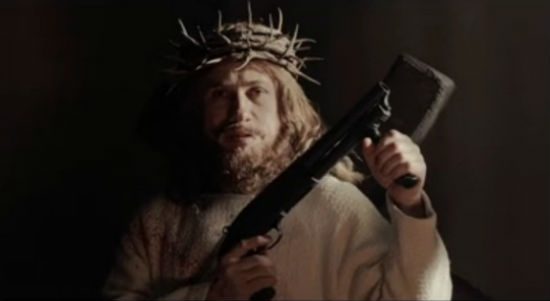Originally posted March 7, 2008.
Read this entire series, for free, via the convenient Left Behind Index. This post is also part of the ebook collection The Anti-Christ Handbook: Volume 1, available on Amazon for just $2.99. Most of Puerto Rico lacks electricity and drinking water. Volume 2 of The Anti-Christ Handbook, completing all the posts on the first Left Behind book, is also now available.
Left Behind, pp. 415-417
Nicolae Carpathia has super powers.
Usually, I don’t have a problem with stories involving super-powered characters. I’ve been reading and enjoying such stories my whole life. Whether it’s Peter Pevensie or Peter Parker, Harry Potter or Buffy Summers, I’m game. Just provide some kind of explanation (radioactive spider, the Chosen one, cosmic rays, the effects of our yellow sun on the last son of Krypton) and set out some basic rules and limitations so that the power, and thus the story, isn’t completely arbitrary and I will gladly come along for the ride.
The other thing I’ll need to consent to such stories is a bit harder to describe. The storyteller needs to provide some indication, some clue, that this is that kind of story. This can be some basic genre shorthand or some other kind of signal, but it has to come fairly early on so that I don’t feel betrayed when suddenly one of the characters begins doing things that no ordinary human can do. There’s probably a name for this or some better way of describing it, and for that I’ll defer to those more immersed in the theory and the study of such stories, but what I’m getting at is that it’s no fair to have Miss Marples suddenly explain in Chapter XXXII that she was able to solve the mystery by using her X-ray vision. That sort of thing violates a reader’s trust. Pull a stunt like that and your super-powered character is in-credible rather than incredible.
Our question here is whether Nicolae Carpathia’s sudden manifestation of super powers presents this sort of betrayal. We’ve only just begun to see the full extent of his mind-control mojo at work. In the remaining pages of this volume, Bruce Barnes will babble a bit of pseudo-scriptural phlebotinum to provide a half-hearted explanation for Nicolae’s powers, and then those powers will be displayed unambiguously. Is that fair?
On the one hand, this seems like the worst sort of ninth-inning rule change. We’ve been told — on the back cover and in the story itself — that Left Behind is supposed to be a ripped-from-the-headlines style thriller set not just in a world like our own, but in the very world we live in. Not the world we live in plus X (where X is magic, vampires, superheroes, etc.), but simply a fictional version of the world we live in. Changing the name of Newsweek to Global Weekly doesn’t violate the terms of that agreement, but changing the laws of physics does.
Set aside for the moment the authors’ woeful inability to portray this or any other world accurately or believably. That’s not the issue here. The issue here is that they’ve told us all along that this story was set in a world in which we know there’s no such thing as super powers or mind-control mojo, and then suddenly — when they’ve plotted themselves into a corner and there’s no other way to escape — we meet a super-powered character who is able to work his mind-control mojo and thereby to prevent their nonsensical plot from grinding to a halt. That sure seems like cheating to me.
But on the other hand we’ve also been told all along that this will be an explicitly supernatural story. From that perspective, complaining about the sudden appearance of a character’s supernatural powers in Left Behind would be a bit like complaining about the existence of paranormal phenomenon on The X-Files. Yet Nicolae’s super powers still seem to be in a different category from the book’s other supernatural events. There’s a big difference between making God a character and allowing God to act with divine powers and the idea that the president of Romania can also do miraculous, godlike things. A monster of the week with telepathic abilities would be part of the bargain for viewers of The X-Files. If Mulder and Scully had suddenly begun using telepathy, that would have violated the bargain.1
The authors would argue, I think, that giving Carpathia miraculous abilities is fair game because he is the Anti-Christ. Since Christ was able to perform miracles, his evil twin should have the same abilities. That would be easier to swallow if Carpathia’s Antichrist powers more closely paralleled the sorts of miraculous deeds attributed to Jesus Christ.
In the Gospels, Jesus is tempted by Satan in the wilderness to perform miracles in order to amass power. The Antichrist, one would expect, would have succumbed to those same temptations.2 We should be seeing the Antichrist performing antimiracles — perversions and inversions of the miraculous signs and wonders told of in the Gospels.
Unlike John of Patmos or the author of John’s epistles (the only place the word “antichrist3” is used in the Bible), LaHaye and Jenkins don’t really seem to regard the sense in which the Antichrist is Christ’s opposite. That opposition is hard to miss in the book of Revelation — beast vs. lamb, power vs. love is one of the book’s central themes — but L&J seem to have missed it both there and in their representation of it here. Their Antichrist is an anti-christ, an anti-messiah, in the sense that he is a false liberator who brings slavery. But where Carpathia chooses to pursue power, those who oppose him do the same. L&J’s version of the evil beast will be defeated, ultimately, not by the lamb, but by the good beast. In Left Behind, good triumphs over evil not because it is intrinsically different, but because it is simply more powerful. God has a bigger gun than the devil.4

But however the authors mean to account for it, the bottom line remains this: Nicolae Carpathia has super powers. Their story — meant to present what they believe are real events that will really happen sometime soon — has a character with super powers in it. Make of that what you will.
It’s not clear whether Nicolae has been using those super powers in the preceding scenes. It’s impossible to believe that the ambassadors of every nation on earth would have been willing, or thought themselves able, to abandon their respective nations’ sovereignty and capacity for self-defense just because they were asked politely to do so by a handsome young polyglot, so it sure seems like Carpathia’s mind-control powers must have been at work at the United Nations.
Then again it also seems impossible that people the world over would be “in a mood to party” upon hearing that their nations, languages, religions and currencies were about to be replaced with new, one-size-fits-all global versions. So is Nicolae somehow projecting his mojo over the airwaves, enchanting the globe via satellite TV? If so, why isn’t Buck affected? He hasn’t yet performed the counter-spell invoking the protection of the Holy Spirit, yet he alone doesn’t seem thrilled with Carpathia’s announcement of global dictatorship.
It’s been five pages since the last phone call, so the phone rings and Buck seems guarded and sullen as he discusses the announcement with his old buddy Steve Plank.
“Pretty exciting, isn’t it?”
“Mind-boggling.”
“Listen, Carpathia wants you here Monday morning.”
“What for?”
“He likes you, man. Don’t knock it.”
It may just be my imagination, but Steve seems to be sounding a bit more hip-cat since he went to work for the Antichrist. In the next page, he will use the word “hustle” as a verb.
Steve explains that Carpathia is planning a meeting with “his top people and the 10 delegates to the permanent Security Council.” It seems from the way they discuss this that those delegates will be selected by Nicolae, rather than appointed by their respective nations. Whether this is how L&J imagine the U.N. works now or if this is meant to be understood as one of Carpathia’s “reforms” isn’t clear, just as it isn’t clear why a Security Council is even necessary now that all the member nations have been disarmed and subsumed into the OWG.
They briefly discuss the role of Jonathan Stonagal and whatisname Todd-Cothran, though Jenkins seems to have lost all interest in trying to make any sense out of their conspiratorial conspiracy of conspirators. He seems relieved to have rendered them redundant and no longer seems to care whether or not they still seem menacing and mysterious. Steve half-heartedly tries to drum up a bit of the old menace by telling Buck that “nobody tells Stonagal” what to do.
“Not even Carpathia?” Buck asks.
That should be, for him, a rather pointed question. As Steve is well aware, Stonagal and Todd-Sidekick tried to kill Buck with a car bomb just a few chapters ago. The only reason he’s not still running for his life is because Carpathia apparently intervened on his behalf, convincing Stonagal to let Buck live in exchange for Buck’s promise never to report on their murky dark doings. So when Steve answers, “Especially not Carpathia. He knows who made him,” you’d think a reasonable response on Buck’s part would be to go back into hiding. Instead, he agrees to go to the meeting and to sit in a room with the two men who killed his friends Dirk and Alan and very nearly killed him as well.
For what it’s worth, Steve reassures Buck that Carpathia, although unable to control Stonagal, is:
“… honest and sincere, Buck. Nicolae will not do anything illegal or underhanded or even too political. He’s pure, man. Pure as the driven snow.”
Sadly, Buck will soon learn what readers figured out hundreds of pages ago — that Carpathia is neither honest nor sincere. That’s a shame. He’d be much more interesting if he were. Then at least we might be able to grasp some motive behind his grasping for power. There could be a compelling story in the tragedy of an honest and sincere man who sought unlimited power in the hopes of achieving unlimited good, of fixing the world through brute force. But that would have made Carpathia the good beast and, as we’ve already seen, the part of the good beast is already taken here in Left Behind. In the authors’ view, fixing the world through brute force is God’s job. (Makes one wonder what they think all that business with the cross was about.)
Steve tells Buck that he will be the only reporter present at this meeting of the new global cabal:
“What’s the catch?”
“No catch. He didn’t ask for a thing, not even favorable coverage. …”
Because, you know, for Steve and Buck, the idea of exchanging access for favorable coverage is no big deal.
“… not even favorable coverage. He knows you have to be objective and fair. The media will get the whole scoop at the press conference afterward.”
“Obviously I can’t pass this up,” Buck said, aware his voice sounded flat.
Buck isn’t the only one who seems aware that this all sounds flat and unenthusiastic. Jenkins will reprise this entire conversation in the next chapter, and he seems to put a bit more effort into it the second time around.
“What’s the matter, Buck? This is history! This is the world the way we’ve always wanted it and hoped it would be.”
“I hope you’re right.”
Steve means it. One, unlimited, unaccountable and all-powerful global government enforcing one world language and one world religion really is “the world the way [he’s] always wanted it to be” because Steve is an Imaginary Liberal. Imaginary Liberals are all closet fascists, don’t you know. If you want to know how they really want and hope the world to be just take the opposite of everything they say and conjure up the most illiberal nightmare conceivable — a world without civil liberties or democracy or freedom of conscience. The fact that liberals all speak and act against such a nightmare scenario is simply evidence of their duplicity.
Imaginary Liberals are thus irredeemable, which is why Buck here has to be shown as less than enthusiastic about the IL dream come true. Buck is destined to be redeemed, so he has to be shown to be a not-really liberal member of the liberal media just as he had to be shown to be a virgin bachelor playboy.
Steve says there’s one final favor Carpathia has to ask of Buck:
“He wants to see that stewardess friend of yours again.”
“Steve, no one calls them stews anymore. They’re flight attendants.”
“Whatever. Bring her with you if you can.”
“Why doesn’t he ask her himself? What am I now, a pimp?”
“Stews?“
Buck objects to being viewed as a pimp. He may also object to Hattie being viewed as a prostitute, although he never says so. His unprecedented siding with Hattie here reflects the authors’ notion of chivalry, not some kind of feminism. If the little ladies want to be called “flight attendants,” then we should humor them.
“C’mon, Buck. It’s not like that. Lonely guy in a position like this? He can’t be out hustling up dates. …”
“I’ll ask her,” he said. “No promises.”
“Don’t let me down, buddy.”
Normally, I’d agree that world leaders “can’t be out hustling up dates,” but there’s nothing normal about Carpathia’s position. It’s not like he has to worry about his reputation or about getting re-elected. He’s scandal-proof, untouchable. Plus everyone who would have had some moral objection to his sexual escapades disintegrated last week. If he wanted to Nicolae could Casanova his way through the Manhattan phone book (alphabetically, of course), sweet-talking women in nine languages (eight of which are soon to be forbidden). If the People magazine thing and his Redford-ish looks didn’t work for him, he could just use his super powers to compel them (because, remember, he’s evil).
But even though he could have any woman in the world, the only one he wants is Hattie. Just as the only reporter he wants present at his big meeting is Buck and, later in the series, the only pilot he wants to hire is, yep, Rayford Steele. There are still 4 billion people on earth, but Carpathia is working closely with the authors to ensure that only a handful of them are ever involved in this story.
– – – – – – – – – – – –
1 This may actually have happened in Season 9, but by that point I’d gotten almost as confused and off-track as the writers.
2 I suppose that Carpathia’s enlisting of Rosenzweig’s miracle formula franchise is vaguely like turning stones to bread, but he’s just piggybacking on somebody else’s miracle there and there’s little to indicate that this dubious parallel is intended by the authors.
3 Antichrists, actually, plural. Which is more than a bit troublesome for the PMD mythology.
4 Or put it this way, in LB, Frodo uses the ring to destroy Sauron. That doesn’t make for the same story with a different ending, that makes for an entirely different story.
















